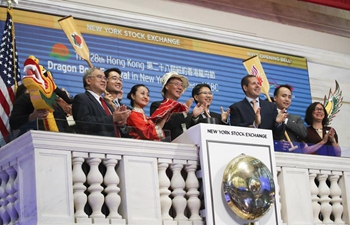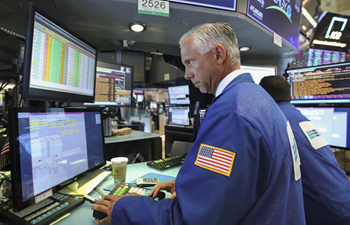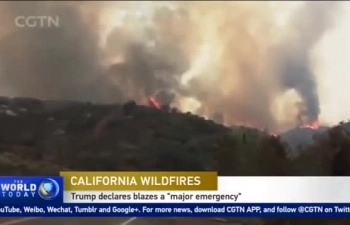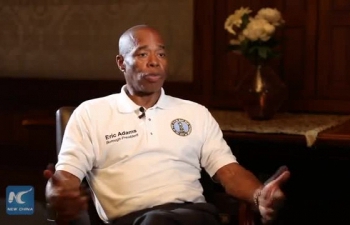WASHINGTON, Aug. 6 (Xinhua) -- The United States on Monday managed to strike a more moderate tone toward Iran after it announced to sanction the country on Tuesday.
Experts said the seemingly inconsistent statements, put together, are indicative of a coercive diplomatic thinking that aims to push for a more comprehensive deal with Tehran.
REINSTALLED SANCTIONS
U.S. President Donald Trump on Monday signed an executive order to implement sanctions. The first batch, which will take effect at 12:01 a.m. Tuesday (0401 GMT), target Tehran's purchase of U.S. banknotes, trade in gold and other precious metals, as well as the use of graphite, aluminum, steel, coal, and software used in industrial processes.
They will also affect transactions related to the Iranian Rial, the issuance of sovereign debts, and the country's automotive sector.
Another round of sanctions, to be reinstalled on Nov. 5, will be on Iran's port, energy, shipping and shipbuilding sectors, its petroleum-related transactions, and business deals by foreign financial institutions with the Central Bank of Iran.
The White House said "the Trump Administration intends to fully enforce the sanctions reimposed against Iran, and those who fail to wind down activities with Iran risk severe consequences."
In a statement, Trump, while attacking the Iran nuke deal, said that "I remain open to reaching a more comprehensive deal" that addresses the full range of Iran's activities, including its ballistic missile program and its accused "support for terrorism."
Before the White House statement, an anonymous senior administration official reiterated to the media via teleconference that Trump is willing to meet with the Iranian leadership at any time, and "our stated policy has not been regime change."
He also said that although Washington is committed to pushing all nations' import of Iranian oil to zero, it is "glad to discuss requests and look at requests" from other nations for exemptions or waivers "on a case-by-case basis."
Trump's National Security Advisor John Bolton also joined in the rarely-seen reconciliatory chorus, as he told Fox News on Monday that the leaders "could take up the president's offer to negotiate with them, to give up their ballistic missile and nuclear weapons programs fully and really verifiably not under the onerous terms of the Iran nuclear deal, which really are not satisfactory."
"If Iran were really serious they'd come to the table. We'll find out whether they are or not," he said.
The comparatively softened remarks toward Iran have forged an apparent distinction with the Trump administration's previous hawkish tone when it decided to leave the Iran deal.
GLOBAL OUTCRY
Iran has stayed relatively cool toward U.S. upcoming actions; still, it bombarded this decision.
Iranian Foreign Minister Mohammad Javad Zarif said on Monday that Trump and U.S. allies Israel and Saudi Arabia have become isolated by their hostile policies toward Tehran, and turned in "the symbol of mistrust in the world."
Iran's President Hassan Rouhani said that the Iranians would make the United States regret for re-imposition of sanctions, claiming that "Trump will learn that these kinds of pressures did not surrender Iranians in the past and will never do so in the future."
Earlier on Monday, the European Union (EU), Britain, France and Germany said in a joint statement they would maintain economic ties with Tehran, and "are determined to protect European economic operators engaged in legitimate business with Iran."
Saying the Joint Comprehensive Plan of Action (JCPOA) is working and delivering on its goal, the statement noted that "this is why the European Union's updated Blocking Statute enters into force on Aug. 7 to protect EU companies doing legitimate business with Iran from the impact of U.S. extra-territorial sanctions."
The statute, introduced in 1996 in response to U.S. extra-territorial sanctions legislation, was amended on June 6 by adding within its scope the list of extra-territorial U.S. sanctions on Iran. It forbids EU residents and companies from complying with the listed U.S. extra-territorial sanctions legislation unless they are exceptionally authorized to do so by the European Commission.
Iran's traditional trade partners like Turkey and India had also vowed earlier not to recognize the U.S. unilateral sanctions.
Israel seems to have become the only one that welcomed the U.S. sanctions. Israeli Intelligence Minister Israel Katz tweeted that the resumption of U.S. sanctions "will compel the Iranians to decide between meeting the demands of the United States ... or risking the regime's collapse and fall."
Israeli Prime Minister Benjamin Netanyahu said on Monday that he congratulates Washington on the decision to reimpose sanctions on Iran, which has brought "an important moment for Israel, the United States, the region, and the entire world."
The move "symbolizes the determination to curb Iran's regional aggression and its ongoing plans to arm itself with nuclear weapons," he said, urging European countries to follow Trump's lead.
U.S.-IRAN OUTREACH STILL CONCEIVABLE
In an apparent bid to exert maximum economic pressure on Tehran, Washington added more areas than it had previously threatened into sanctions' targets, such as transactions regarding the two nations' currencies and Iran's metal and software industries.
Wayne White, former deputy director of the Middle East Intelligence Office of the State Department, told Xinhua in an interview that these additional sanctions were to disrupt Iran's industrial sector more broadly and would further disrupt its financial sector.
Experts said that these actions, together with a bid to forge global coalition to counter Iran, aimed to put more pressure on the Iranian economy regional influence. They also looked to set stage for graver sanctions on Iran's oil export slated in November.
"They wanted to make this tougher than it originally appeared, and in particular that they want to move toward financial sanctions," said David Pollock, a senior fellow at the Washington Institute for Near East Policy. "It will be very hard for Iran to conduct international transactions denominated in dollars, and I think the idea is probably to put even more pressure on the Iranian currency."
"So that is seen as something that creates a lot of popular anger inside Iran, and I think that that's really the main goal of applying this leverage in order to get the Iranian people to put pressure on their own government, to change the policies," he told Xinhua.
As part of Trump's coercive diplomacy, Washington reiterated its readiness for a summit to consult on a more comprehensive deal, all in a bid to force Tehran into a new deal that fulfills U.S. demands.
Given the Iranian economy that is highly dependent on oil export, it has thus been inconceivable to see a meeting between Trump and his Iranian counterpart on the sidelines of a UN gathering next month.
However, White said that Trump "knows a nation's withdrawal from an agreement negotiated in good faith followed by coercion aimed at initiating talks to produce an agreement more favorable to that nation is little more than international blackmail."
"In such circumstances, the offer of talks probably was meant to cause division within a beleaguered Iran over whether to attend, not so much to produce an actual meeting - almost certainly not one that would likely end well," he warned.
"Indeed, Trump's ultimate objective if he can secure sufficient cooperation on sanctions from key European countries party to the JCPOA would be the collapse of the agreement entirely."
"The key looming question will be the extent to which Washington can convince its allies-from London to Tokyo-to follow suit," he said. "Another major question will be if a number of the allies do not follow the U.S. lead on sanctioning Iran in areas beyond oil, will Washington then stoop to imposing so-called 'secondary sanctions' on those allies - a move that would greatly antagonize America's friends."
Matthew Rusling from Washington also contributed to the story.













